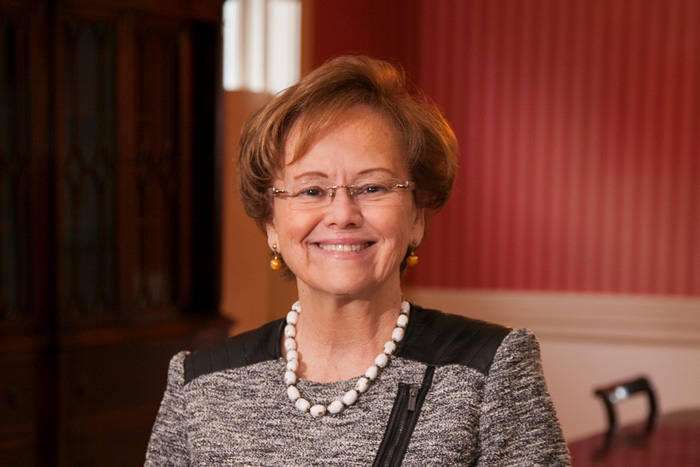Inspired to Serve: How Colleges and Universities Can Help Create the Next ‘Greatest Generation’

Margee Ensign
by Margee M. Ensign and Aaron Williams
What is the role of colleges and universities at this critical moment in our democracy? We know firsthand the mounting expectations of higher education. We must provide equitable access to education. We must prepare students for careers and jobs. We must provide an inclusive space that is safe and welcoming for all. We must innovate and contribute groundbreaking research that advances science. It’s important work that is being tested like never before as we operate during a global pandemic and in a society experiencing pervasive, systemic racism and political and social unrest. Colleges and universities have fragmented priorities, yet we aspire to do it all. But what is unmovable and what must remain a priority is the need to help students fulfill their desire to change the world.
Our future leaders must graduate with practical experience in engaged citizenship. With a view toward more comprehensive, systematic and active training of citizen-leaders for a democracy in crisis, we can build on students’ motivation and enrich their educational experience in the context of higher education. We can better train our students to become citizen-leaders and better stewards of our democracy. The recent national movement in pursuit of justice and equality demonstrates the strong interest and idealism of young people that should be tapped.
We ask college and university presidents, corporate leaders, community leaders and interested students to mobilize, act and establish a “College Citizenship Commitment” initiative that features a full, paid semester of wider-world work in the community. An initiative such as the one we propose would be a bold and innovative way to engage our greatest national resource—our committed young college students. This is our way of getting back to President John F. Kennedy’s call to “ask what you can do for your country,” a challenge for everyone to contribute to the public good. It was out of that noble mindset that the Peace Corps and AmeriCorps VISTA were born.
The Peace Corps, that iconic American agency, is an amazing example of a success story which has showcased national service for nearly 60 years. Historically, recent college graduates represent 90% of Peace Corps volunteers, and we have seen firsthand women and men serving on every continent and in hundreds of countries over six decades.
What a sight it is to see volunteers on the front lines, working in microbusiness-support organizations to create new women-owned small businesses or teaching math and science in rural primary schools. Others distributed mosquito nets in remote villages to fight malaria and worked in HIV/AIDS clinics or helped small farmers improve irrigation systems. And it was marvelous to see the admiration in the eyes of their visiting parents, witnessing their children, now as young adults engaged with the world, speaking one or two languages, maneuvering expertly in a new culture!
We have witnessed the dedication of these steadfast and enthusiastic Americans, working side by side with their local colleagues, embraced by their communities and becoming outstanding global citizens—all while in service to the United States. It’s always gratifying when former volunteers introduce themselves to us in airports or in the streets of our cities, or at global events in the U.S. and overseas. They consistently describe how serving in the Peace Corps transformed their lives.
As our society grapples with our national crises in terms of inequality and a global pandemic, now is precisely the time for new thinking about unleashing the power of our young people, our next generation of leaders. We believe that today’s challenges are the ideal cauldron for training and testing this new “great generation.”
A strategy and action plan for building a culture of service in America is gaining momentum. Congress recently set plans in motion to prioritize national service. Thanks to a bipartisan-supported bill, the Cultivating Opportunity and Response to the Pandemic Through Service (CORPS) Act could more than triple the number of AmeriCorps positions and increase significantly the stipends and grants young people receive by participating. In January 2018, the National Commission on Military, National and Public Service was launched, a bipartisan, 11-member commission created by Congress with the purpose to develop recommendations to inspire more Americans—specifically young people—to participate in military, national and public service and to review the military selective service process.
The commission’s final report, “Inspired to Serve,” complete with policy recommendations and legislative proposals, was issued in March 2020 and encompasses broad recommendations for military, public and national service. This clearly is the blueprint for launching the next “great generation” of leaders that our nation is desperately seeking today. In our view, the “College Citizenship Commitment” embodies this vision, and this is our clarion call for higher education leaders to embrace this opportunity.
Margee M. Ensign is president of Dickinson College, where she has established the Center for Civic Learning & Action with funding from the Andrew W. Mellon Foundation. Under Ensign’s leadership, Dickinson recently received the Carnegie Community Engagement Classification. Previously, she served as president of the American University of Nigeria, in Yola, where she co-founded and chaired the Adamawa Peace Initiative, a Yola-based group of civic and religious leaders that has successfully promoted peace in the area through education, empowerment and community development while feeding 300,000 refugees from Boko Haram.
Aaron Williams served as the 18th director of the U.S. Peace Corps from 2009 to 2012 under former President Barack Obama. He is senior adviser emeritus for international development and government relations at RTI International. Previously at RTI, he was executive vice president of the International Development Group. Before joining RTI, Williams served as a senior official at the U.S. Agency for International Development. He is on the Dickinson College's Board of Trustees and also an adjunct professor of health policy and management at the University of North Carolina at Chapel Hill - Gillings School of Global Public Health.
Published August 3, 2020